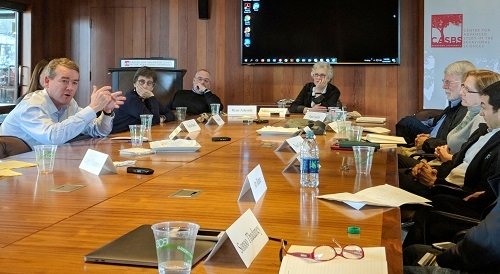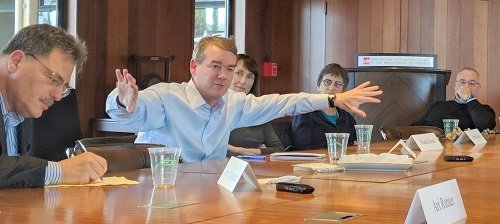CASBS Hosts Senator to Discuss Policy Challenges of Tech for Workers, Democracy
Even in a political landscape where legislators and regulators in Washington, in Bennet’s estimation, are increasingly “decoupling” from the country’s priorities, the velocity of change and thorny ethical and legal dilemmas eventually will compel action.
Bennet’s visit to CASBS is part of his ongoing effort to be ahead of the curve.
Bennet and his staff were eager, as well, to get a unique perspective on the policies and practices of the technology companies they had been visiting in the Bay Area. They reached-out to the Center after discovering the CASBS “Future of Work and Workers” essays in Pacific Standard, then subsequently examining other CASBS initiatives and activities, among them the Center’s recent public symposium on “AI, Automation, and Society.”

The informal working-lunch was convened by CASBS director Margaret Levi, who assembled a small but diverse group of experts consisting of CASBS fellows, research affiliates, board members, and Stanford-based scholars. The topics of conversation leveraged some of the Center’s key thematic and programmatic strengths: the ethics and governance of artificial intelligence (AI), the future of work and the education and training of workers, and the implications of a variety of technological innovations and platforms for U.S. democracy and institutions.
Three short presentations and a response by Senator Bennet stimulated a robust discussion. Levi highlighted themes central to the Center’s “Future of Work and Workers” project, still ongoing, and its newer spin-off project on creating a moral economy for the future. She placed particular focus on giving workers new means of voice and efficacy, whether through digital hiring halls, improved social insurance and re-skilling programs, innovative forms of representation, or a better data measurement infrastructure for occupations and jobs. CASBS board chair and California Supreme Court Justice Tino Cuéllar outlined the downstream challenges of AI in the cyber-security realm and at the intersection of law, behavior, and political institutions. The issues he raised are integral to a CASBS project (in partnership with the Berggruen Institute and Stanford’s engineering school) on the effects of automation and technology on humans and society. CASBS fellow Nate Persily provided an overview of the structural stressors that the internet and other technologies are exerting upon political campaigns and elections, resulting in a further erosion of trust in democratic institutions. Many of the concerns he put on the table will be further untangled at an upcoming CASBS workshop on digital technology and democratic theory (co-sponsored by the Social Science Research Council).
Senator Bennet assiduously took notes and clearly relished the opportunity to listen to, then interact with, a room full of cutting-edge thinkers.
“There certainly are people in the [federal] agencies thinking about these issues. The United States Congress, for the most part, is not. If you look for hearings or testimony on this, or imagine Congress organizing itself in a way that is thoughtful or responsive to any of this, it’s not doing it. So that’s the reason I’m here – to listen and have some early conversations.”
And amidst all the talk of modern technology’s effect on democracy and society now – as well as prognostications of future effects from the presenters and other attendees (futurist Paul Saffo, U.S. District Court judge Lucy Koh, CASBS board member John Seely Brown, Stanford political scientist Larry Diamond, and others) – Bennet concisely communicated a more elemental, if not more pessimistic, message.
Though there’s much to be gained by expanding our sources of information, does that mean information necessarily is being democratized? According to Bennet, the elegant mechanisms that the country’s founders established are fraying under the strain of a redefinition of rights and speech (think the Supreme Court’s Citizen’s United decision and “fake news” controversies). There seems to be very little governing our behavior – online or otherwise.
“The pluralism that the founders were banking on – the idea that diversity of opinion, diversity of experience, and diversity of thought would not only protect us from tyranny but allow us to make decent decisions – is getting corroded by social media and a media environment where animosity is a sort of coin of the realm. A virtuous pluralism is getting lost.”
What about mediating organizations and institutions – including political parties – that the founders did not envision or consider?

Right now there’s little ability for parties (in Washington) to come together to create an enduring approach to critical issues, said Bennet.
“We’re not using institutions as a mechanism for resolving disputes. We are using them to have disputes.”
No argument there.
Bennet further lamented that the private sector nearby in Silicon Valley, with all its collective brain power and understanding of what the future might hold, is so little connected to the children he once served in his former capacity as superintendent of public schools in Denver, or the children of Detroit, for example. They could benefit the most from tech, yet seem to be the least visible to many Silicon Valley entrepreneurs and innovators, in his opinion.
So what can be done about tech-society disconnects, among them the one cited by the senator?
In response, Levi put forth a vision that the Center has been pursuing. “We at CASBS want to make sure social scientists and humanists, who really have been thinking about these issues, are side-by-side with engineers and at the table from the get-go, at the design stage, when decisions about process are put in place,” she said. “That’s the only way these firms will really think about potential downstream consequences and whether their products and services really meet human needs in some larger sense.”
By the time he departed, one clear takeaway for Bennet was that an important part of the solution lies in the deeply interactive, collaborative thinking that engaging with CASBS provided him, and that CASBS likewise can provide to other interested policy makers.
